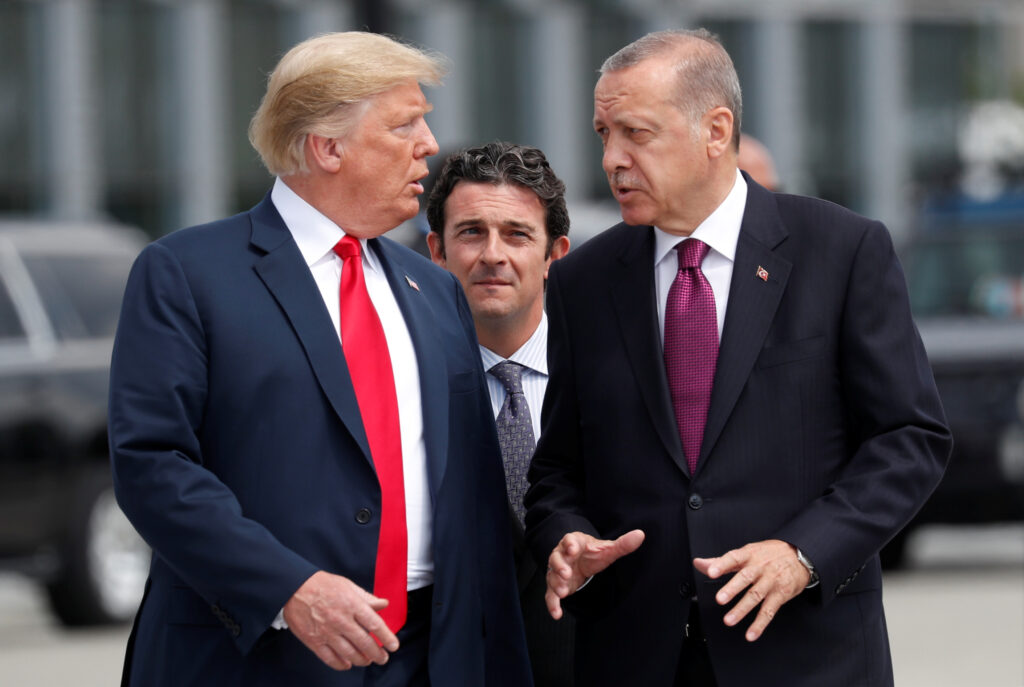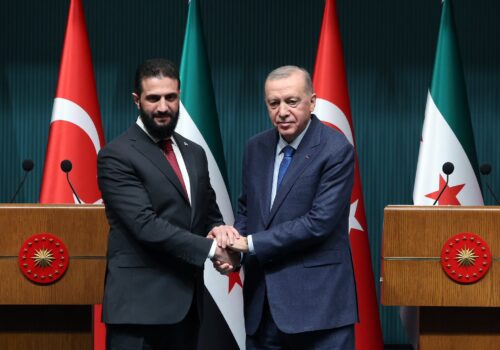Could Trump be ‘mediator-in-chief’ for Turkey and Israel in Syria?
If US President Donald Trump still aspires to achieve a historic “deal of a century” in the Middle East, ensuring that Israeli Prime Minister Benjamin Netanyahu and Turkish President Recep Tayyip Erdogan resolve their differences in Syria will prove to be an important part of the equation.
Israel has many concerns about what happens in Syria following the fall of Bashar al-Assad’s regime, not least of which are about Turkey’s growing influence and efforts to establish a military presence there. Netanyahu and Erdogan have a long list of grievances against one another, and relations between Turkey and Israel are at perhaps their lowest point in history.
But Netanyahu has a chance to turn tactical challenges into strategic opportunities, rather than continuing the fool’s errand of trying to shape Turkey’s role in Syrian affairs through military force. The Israeli prime minister should take Trump up on his offer to help Israel and Turkey figure out how to “get along.”
In recent weeks, Azerbaijan has facilitated at least two meetings between Turkey and Israel to discuss their respective interests in Syria, which should be applauded. As a country that has diplomatic relations with both countries, Azerbaijan is uniquely able to mediate between Israel and Turkey. However, Azerbaijan is particularly close to Turkey and has its own interests in Syria, particularly with respect to energy resources and economic partnerships.
Trump advertised his willingness to mediate between Israel and Turkey while sitting alongside Netanyahu in the Oval Office during his April visit to Washington. As Israel and Turkey compete for influence in Syria, in dramatically different ways and for different reasons, a Turkey-Israel detente is a deal Trump would be wise to support, particularly for the sake of stability in Syria.
Israel and Turkey’s rollercoaster relationship
Turkey and Israel have a complicated history. Turkey was the first Muslim-majority country to recognize Israel in 1949, and it recognized the Palestinian state in 1988. Israel and Turkey, however, kept their bilateral relationship fairly quiet until the 1990s. The decade saw both positive and negative regional shifts that allowed the two to deepen diplomatic, security, and economic relations, including: former Iraqi leader Saddam Hussein’s attack on Kuwait, the rise of Kurdish separatist and Islamic fundamentalist movements, Turkish tensions with Greece over the Aegean islets, and the 1993 Oslo Accords. But tensions began to rise in the early 2000s with the collapse of the Israeli-Palestinian peace process and the onset of the second intifada, and Erdogan’s rise to power. They severed, however, after the 2009-2010 Israel-Gaza war, and the Israeli interception of the Turkish Mavi Marmara flotilla bound for Gaza in 2010. Bilateral relations have never returned to pre-2010 levels.
Today, there is no love lost between Erdogan and Netanyahu, but Syria presents a good excuse to try to mend ties. With Turkey seeking to establish a military presence in Syria, and Ankara’s ongoing support for interim President Ahmed al-Sharaa’s government, Turkey and Israel are now also effectively neighbors. Both Erdogan and Netanyahu also fancy themselves friends of Trump and want to stay on the right side of his ledger.
Incentives to get along in Syria
According to Turkish and Israeli officials, the two countries have created a deconfliction mechanism for their Syria operations—a communication channel aimed at avoiding unintentional military clashes between Turkish and Israeli forces there. This is a smart and operationally essential move. But given the current tenor of relations between Turkey and Israel, more than just deconfliction will be needed to prevent escalation between the two countries, particularly if Israel continues to conduct airstrikes deep in Syria and Turkey establishes a consistent presence there.
When Russia intervened militarily in Syria in 2015, Israel understood that it needed to both avoid an accidental military escalation with Moscow by deconflicting its military operations against Iranian-backed militias there, as well as strengthen its diplomatic relationship with Russia to maintain an open communication channel with its then-new “neighbor.” During the following year, Netanyahu met Russian President Vladimir Putin at least four times—more frequently than he met any other head of state.
With the fall of the Assad regime, Israel faces a whole new set of challenges in Syria.
SIGN UP FOR THIS WEEK IN THE MIDEAST NEWSLETTER
Assad was no friend of Israel, but during his tenure, Israel had gotten comfortable with a relatively predictable, if risky, status quo. When al-Sharaa assumed power, everything became uncertain. For the first time in decades, the leader of Syria did not consider Israel an enemy state. Al-Sharaa even clearly stated he had no interest in picking a fight with Syria’s “neighbors,” including Israel.
On the other hand, as Israelis are quick to remind anybody who mentions al-Sharaa’s name, he was previously known under the nom de guerre Mohammed Abu al-Jolani and has Islamist roots as a former member of al-Qaeda and leader of the al-Qaeda offshoot Hayat Tahrir al-Sham (HTS). Israel fears he may one day want to reclaim his namesake, the Golan Heights. So far, al-Sharaa has mostly said all the right things as he tries to stabilize and rebuild a governance structure in Syria, despite numerous impediments. But Israel is understandably skeptical and fearful of Syria’s new leadership and environment.
Still reeling from the October 7, 2023 Hamas attacks in the south and Hezbollah strikes in the north, Israel has taken a forward-leaning military approach in Syria that seems to be focused on pushing threats away from its borders, flexing its military muscle to make its presence and capabilities known, and trying to keep Turkey out. Rather than keeping to its own side of the Syrian border and protecting Israeli sovereign land in all the ways Israel has long known how to do, Israel maintains outposts along the Syrian side of the border and has repeatedly conducted airstrikes within Syria. As Israel’s military engagement in Syria has expanded, Israel has gotten the Syrians’ attention and again made itself an enemy.
How can the US help
It was apparent from the statement Netanyahu released upon his return home from Washington that he and Trump have a different view of Turkey in Syria.
Israel would prefer minimal Turkish influence, while Trump has repeatedly publicly expressed high praise for Erdogan and applauded him for Turkey’s role in overturning the Assad regime. It seems clear that the United States will not be helping Israel push Turkey out of Syria. Still enmeshed in Ukraine, it seems unlikely Russia would do much, either, to advocate for its own expanded engagement in Syria.

Trump prefers not to start or get involved in wars, and his administration has cut off the majority of foreign assistance to traditional US partners, particularly to support civil society, governance building, educational programs, and other elements of US soft power.
For better or worse, it is unlikely that Trump would seek to get involved in Syria’s internal affairs or al-Sharaa’s efforts to rebuild the Syrian state.
But Trump likes making deals, and he seeks to expand the Abraham Accords and achieve Saudi-Israel normalization.
For the sake of both of those goals, Washington should be concerned that Syria is given a chance to become a stable, secure, and prosperous country, without external actors like Turkey and Israel using Syrian territory to fight their own battles. President Trump’s meeting with al-Sharaa in Riyadh and announcement that Washington will remove sanctions on Syria reflect that he understands Syria’s stability and prosperity are in his interest, too. Trump may even have his sights on achieving Syria-Israel normalization, but that is still at least a ways off. Working toward Turkey-Israel detente in Syria would be a good place to start.
Washington’s mediation between Turkey and Israel in Syria also has uniquely bipartisan Congressional support, notably from Republican Senate Foreign Relations Committee Chairman Jim Risch and Democratic Ranking Member Jeanne Shaheen.
In April, the committee leaders sent a letter to US Secretary of State Marco Rubio and Treasury Secretary Scott Bessent urging the Trump administration to remove barriers to US engagement with Syria. The bipartisan senators noted that the “growing competition between Israel and Türkiye over Syria’s trajectory […] may threaten American interests,” and urged the administration “to move quickly to mediate between our allies.”
Trump’s unpredictable and often unconstrained approach to decision-making confers him a certain amount of leverage. His bellicose nature and broader regional interests, combined with Israeli and Turkish interest in avoiding a direct military confrontation, might be just enough to force the right Israeli and Turkish officials into a room together to figure out how to get along.
The US president could also encourage both parties to take a constructive role in helping Syria to stabilize and rebuild. Al-Sharaa knows Syria needs external support, but he has also made clear that he will not pledge allegiance to any one benefactor or tolerate external manipulation. Trump should be telling Turkey to let al-Sharaa lead in the Turkey-Syria relationship, and he should be pressuring Netanyahu to hold fire and give diplomacy a chance, with Turkey in the near term, and then maybe eventually also with Syria.
None of this is easy, and Trump has already set out to negotiate a number of foreign policy deals, very few of which have come to fruition. But this one is worth the shot—and would be a meaningful win if achieved.
Rachel Brandenburg is the Washington Managing Director and Senior Fellow at the Israel Policy Forum, and an Adjunct Senior Fellow at the Center for New American Security.
Further reading
Tue, May 13, 2025
Experts react: Trump just announced the removal of all US sanctions on Syria. What’s next?
New Atlanticist By
Our experts provide their insights on how the removal of US sanctions on Syria would affect the country and the wider region.
Tue, Apr 1, 2025
Israel is making a miscalculation in southern Syria. Here is why.
MENASource By Ömer Özkizilcik
Israel’s approach in southern Syria risks deepening sectarian divisions, eroding the Druze community’s standin, and fueling broader instability.
Tue, Apr 1, 2025
The only viable solution: an independent Syria, not a Turkish protectorate
MENASource By
After a risky bet on the Syrian opposition, Turkey is weighing where to place its bets between dueling visions for the new Syria.
Image: FILE PHOTO: U.S. President Donald Trump talks to Israeli Prime Minister Benjamin Netanyahu during a meeting where Trump announced nuclear talks with Iran, Washington, U.S., April 7, 2025. REUTERS/Kevin Mohatt/File Photo/File Photo


